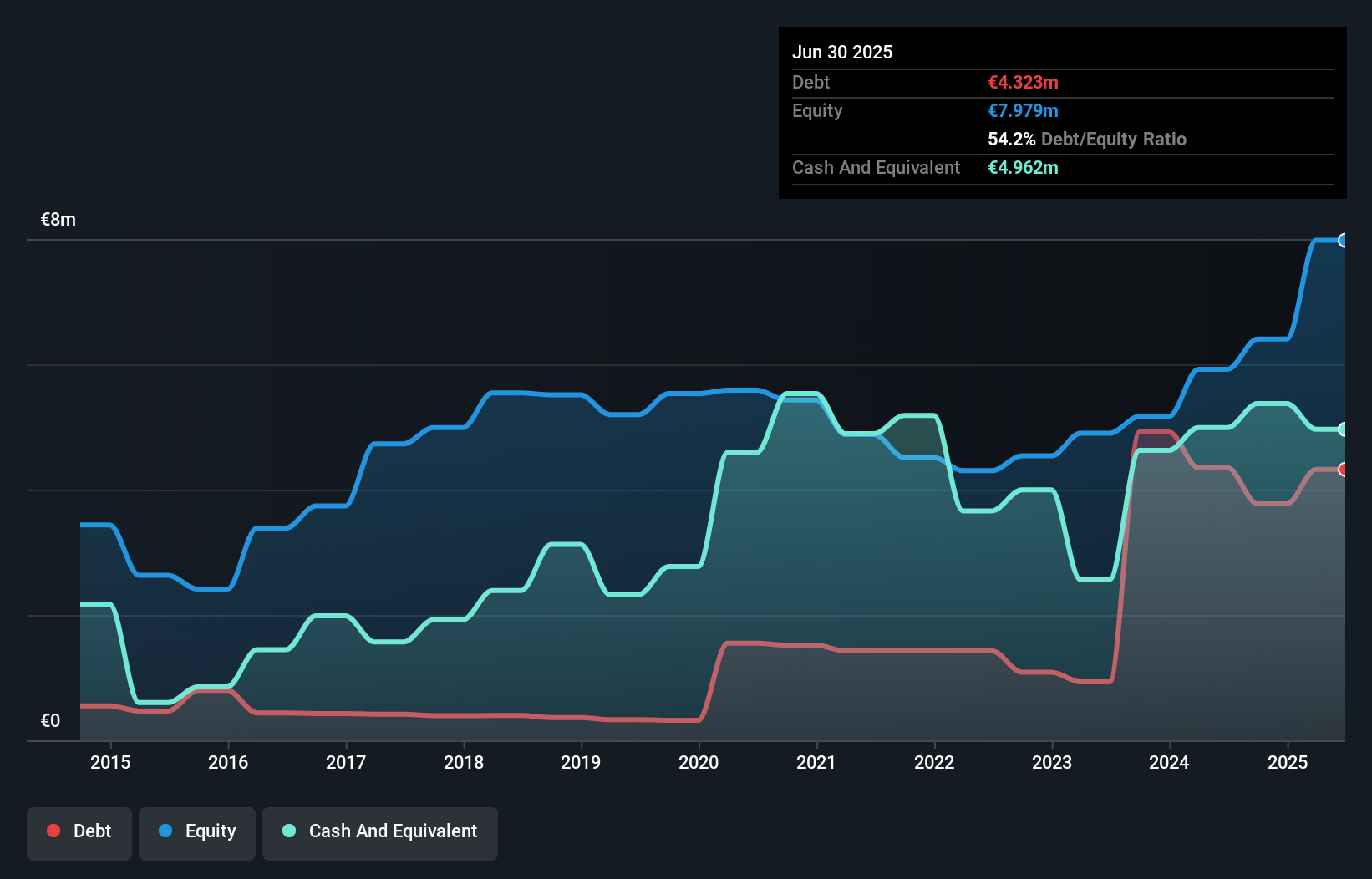Warren Buffett famously said, 'Volatility is far from synonymous with risk.' So it might be obvious that you need to consider debt, when you think about how risky any given stock is, because too much debt can sink a company. We can see that Logic Instrument S.A. (EPA:ALLOG) does use debt in its business. But the real question is whether this debt is making the company risky.
What Risk Does Debt Bring?
Generally speaking, debt only becomes a real problem when a company can't easily pay it off, either by raising capital or with its own cash flow. If things get really bad, the lenders can take control of the business. However, a more frequent (but still costly) occurrence is where a company must issue shares at bargain-basement prices, permanently diluting shareholders, just to shore up its balance sheet. Of course, plenty of companies use debt to fund growth, without any negative consequences. The first thing to do when considering how much debt a business uses is to look at its cash and debt together.
What Is Logic Instrument's Net Debt?
The chart below, which you can click on for greater detail, shows that Logic Instrument had €4.32m in debt in June 2025; about the same as the year before. However, it does have €4.96m in cash offsetting this, leading to net cash of €638.4k.

A Look At Logic Instrument's Liabilities
According to the balance sheet data, Logic Instrument had liabilities of €17.7m due within 12 months, but no longer term liabilities. Offsetting these obligations, it had cash of €4.96m as well as receivables valued at €15.2m due within 12 months. So it can boast €2.50m more liquid assets than total liabilities.
This short term liquidity is a sign that Logic Instrument could probably pay off its debt with ease, as its balance sheet is far from stretched. Simply put, the fact that Logic Instrument has more cash than debt is arguably a good indication that it can manage its debt safely.
Check out our latest analysis for Logic Instrument
In addition to that, we're happy to report that Logic Instrument has boosted its EBIT by 59%, thus reducing the spectre of future debt repayments. When analysing debt levels, the balance sheet is the obvious place to start. But ultimately the future profitability of the business will decide if Logic Instrument can strengthen its balance sheet over time. So if you want to see what the professionals think, you might find this free report on analyst profit forecasts to be interesting.
Finally, while the tax-man may adore accounting profits, lenders only accept cold hard cash. While Logic Instrument has net cash on its balance sheet, it's still worth taking a look at its ability to convert earnings before interest and tax (EBIT) to free cash flow, to help us understand how quickly it is building (or eroding) that cash balance. In the last three years, Logic Instrument's free cash flow amounted to 30% of its EBIT, less than we'd expect. That weak cash conversion makes it more difficult to handle indebtedness.
Summing Up
While we empathize with investors who find debt concerning, you should keep in mind that Logic Instrument has net cash of €638.4k, as well as more liquid assets than liabilities. And it impressed us with its EBIT growth of 59% over the last year. So is Logic Instrument's debt a risk? It doesn't seem so to us. The balance sheet is clearly the area to focus on when you are analysing debt. But ultimately, every company can contain risks that exist outside of the balance sheet. For example Logic Instrument has 3 warning signs (and 1 which is concerning) we think you should know about.
When all is said and done, sometimes its easier to focus on companies that don't even need debt. Readers can access a list of growth stocks with zero net debt 100% free, right now.
New: AI Stock Screener & Alerts
Our new AI Stock Screener scans the market every day to uncover opportunities.
• Dividend Powerhouses (3%+ Yield)
• Undervalued Small Caps with Insider Buying
• High growth Tech and AI Companies
Or build your own from over 50 metrics.
Have feedback on this article? Concerned about the content? Get in touch with us directly. Alternatively, email editorial-team (at) simplywallst.com.
This article by Simply Wall St is general in nature. We provide commentary based on historical data and analyst forecasts only using an unbiased methodology and our articles are not intended to be financial advice. It does not constitute a recommendation to buy or sell any stock, and does not take account of your objectives, or your financial situation. We aim to bring you long-term focused analysis driven by fundamental data. Note that our analysis may not factor in the latest price-sensitive company announcements or qualitative material. Simply Wall St has no position in any stocks mentioned.
About ENXTPA:ALLOG
Logic Instrument
Manufactures, distributes, and sells mobile computers for professional applications.
Undervalued with proven track record.
Market Insights
Community Narratives




